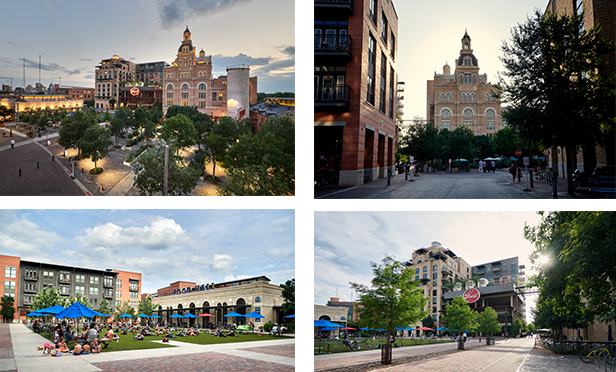With all of the ink spilled over retail's trials during COVID-19, one critical factor is typically overlooked: the need for connectedness. It's a key theme for Natalie G. Smith, CPM, immediate past president of the IREM (Institute of Real Estate Management) San Antonio chapter, and senior property manager at the Pearl in San Antonio.
But a little backstory is called for. The Pearl is more than the name implies. What started as Pearl Brewery back in 1883 is a 22-acre mixed-use gathering spot for San Antonians. It boasts no fewer than 32 restaurant and retail locations, including a year-round farmer's market and a built-in customer base from the office tenants and multifamily residents attached to the center.
 Pearl, San Antonio, Texas
Pearl, San Antonio, Texas Recommended For You
"It's the top culinary and cultural destination for San Antonio," says Smith. "Our mission is to create places and experiences to cultivate human connectedness."
That became a tall order this past February, when the full impact of the pandemic was first felt. As the market rode the ongoing wave of the still-booming economy, Pearl tenants hit 2020 "with great momentum," she says, before commerce ground to a near halt.
And this is where the connectedness showed itself, first with the Pearl occupants. It also underscored the best-practices approach favored by IREM.
Forging Strong Partnerships
"We consider our shops and restaurants to be partners," she explains. "So, we met with them immediately when the government started to shut down non-essential businesses, and we worked with them to offer flexible relief options and brainstorm ways to pivot their businesses."
That exercise in pivoting included expanding tenants' digital presence if they had one, helping those that didn't initiate one and emphasizing two strategies that have become commonplace: online delivery and curbside pickup.
And through it all, Pearl tenants found the time to support the local community. Smith tells of one clothing retailer who turned to manufacturing masks, and a restaurant became an essential grocer. "Others chose to donate a portion of their product sales to causes such as the local food bank," she explains.
Of course, there's also a practical aspect to such initiatives. They keep the retailers' names in front of the public, and Smith reports that since March, some tenant sales have jumped up to 85 percent of 2019 performance.
COVID and the Value Proposition
All property managers faced first-time challenges with the onset of the pandemic. While Pearl management worked with its tenant base, it also faced challenges of its own, all dealing directly or indirectly with maintaining asset value.
Top among those was "managing our time and resources to communicate with the tenants and the public," Smith says. "It was necessary to stay connected, even more so now that we're starting to re-open. Our marketing department created a daily COVID report that went out to our tenants because they were struggling to keep up with the latest governmental requirements."
A critical part of that messaging came in safety. The Pearl website puts what Smith calls a "living pledge" front and center, stating for tenants and customers alike the commitment Pearl was making to their health and safety.
Maintaining a handle on the cost of services presented another challenge. "How do you anticipate and manage costs when they fluctuate based on completely unpredictable foot traffic?" she asks.
The answer in part was to turn to internal resources and increased technology, "applications we wouldn't have thought of before." On the first score, she relied more heavily on staff than hired services for such responsibilities as power washing or painting. On the second, one of the applications was the installation of sensors on trash compactors to alert staff when they were full. "It's not sexy, but it's effective," she says.
In terms of budgeting for 2021, this year can offer only a meager baseline. "We're trying to be as lean as possible," she says. "We're relying a lot on 2019 historical data and making guesstimates based on sales activities, foot traffic and trends I'm reading."
Returning to Normal…Sort of
The latest stage of the COVID response seems to be returning as closely as possible to normal while watching our social distancing. Slowly, people are coming out of hiding and eating out once again, even if they have to remove masks to take a sip of wine.
"Retail will continue to find its sweet spot and operate within the COVID environment," says Smith. "Consumers are becoming increasingly comfortable returning to stores and restaurants."
Which brings us back to the question of connectedness. The smart retailers cultivated loyalty via digital means over the past few months, even picking up some new customers along the way, Smith says. "Now they're rebuilding trust in the physical space. People seek that connectedness. Especially now. We can't undervalue its importance."
© 2025 ALM Global, LLC, All Rights Reserved. Request academic re-use from www.copyright.com. All other uses, submit a request to [email protected]. For more information visit Asset & Logo Licensing.









